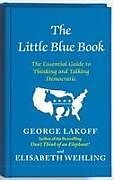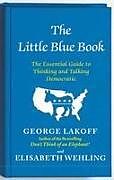The Little Blue Book
Einband:
Kartonierter Einband
EAN:
9781476700014
Untertitel:
The Essential Guide to Thinking and Talking Democratic
Genre:
Politikwissenschaft
Autor:
George Lakoff, Elisabeth Wehling
Herausgeber:
Simon & Schuster N.Y.
Anzahl Seiten:
160
Erscheinungsdatum:
01.01.2012
ISBN:
978-1-4767-0001-4
Provides guidelines for United States Democrats to connect moral values to important policies, using practical tactics to guide political discourse away from extreme positions.
#8220;The Little Blue Book gives progressives not just invaluable tools but, more importantly, an infusion of the hope desperately needed to fix our broken politics. By mapping the political brain, Lakoff and Wehling have shown Democrats the surest way to find their spines.” —Ken Cook, President, Environmental Working Group
Autorentext
George Lakoff is Goldman Distinguished Professor of Cognitive Science and Linguistics at the University of California, Berkeley. He is the author of the New York Times bestseller Don't Think of an Elephant!, among other works, and is America's leading expert on the framing of political ideas.
Klappentext
“The essential handbook for thinking and talking Democratic—must reading not only for every Democrat but for every responsible citizen” (Robert B. Reich, former Secretary of Labor and author of Beyond Outrage).
“The essential handbook for thinking and talking Democratic—must reading not only for every Democrat but for every responsible citizen” (Robert B. Reich, former Secretary of Labor and author of Beyond Outrage).
Voters cast their ballots for what they believe is right, for the things that make moral sense. Yet Democrats have too often failed to use language linking their moral values with their policies. The Little Blue Book demonstrates how to make that connection clearly and forcefully, with hands-on advice for discussing the most pressing issues of our time: the economy, health care, women’s issues, energy and environmental policy, education, food policy, and more. Dissecting the ways that extreme conservative positions have permeated political discourse, Lakoff and Wehling show how to fight back on moral grounds and in concrete terms. Revelatory, passionate, and deeply practical, The Little Blue Book will forever alter the way Democrats and progressives think and talk about politics.
Leseprobe
INTRODUCTION
The Importance of Moral Frames
The central issue of our time is what kind of country America is and ought to be, that is, what system of values should govern us. First, we must understand that all politics is moral: every political leader says to us that we should do what he or she recommends because it’s right, not because it’s wrong or doesn’t matter. And today our politics is governed by two very different views of what is right and wrong.
The progressive view, mostly in the Democratic Party, is that democracy depends on citizens caring about each other and taking responsibility both for themselves and for others. This yields a view of government with a moral mission: to protect and empower all citizens equally. The mechanism for accomplishing this mission is through what we call the Public, a system of public resources necessary for a decent private life and a robust private enterprise: roads and bridges, education, health care, communication systems, court systems, basic research, police and the military, a fair judicial system, clean water and air, safe food, parks, and much more.
Conservatives hold the opposite view: that democracy exists to provide citizens with the maximum liberty to pursue their self-interest with little or no commitment to the interests of others. Under this view, there should be as little of the Public as possible. Instead, as much as possible should be relegated to what we call the Private. The Private is comprised of individuals (private life), businesses owned by them (private enterprise), and institutions set up by groups of individuals (private clubs and associations). The Private is, for conservatives, a moral ideal, sacrosanct, where no government can tread, whether to help or hinder, regulate, or even monitor. No one should have to pay for anyone else. Private interests should rule, even if that means that corporate interests, the most powerful of private interests, govern our lives through a laissez-faire free market. Citizens are free to sink or swim on their own.
Each moral worldview comes with a set of issue frames. By frames, we mean structures of ideas that we use to understand the world. Because all politics is morally framed, all policy is also morally framed, and thus the choice of any particular policy frame is a moral choice. Americans are now faced with two sets of moral choices, each leading the nation in opposite directions. Nowhere is this clearer than in the issue of health care, so let us look at this example in some detail.
Rudolph Giuliani, in his 2008 run for the presidency, likened health care to a product, using the example of a flat-screen TV. Not everyone, he argued, deserves a flat-screen TV. If you want one, work for it and save up for it. Similarly not everyone deserves health care, but you should be free to buy it if you want it. Like a flat-screen TV, health care is in this view a product. If you want a product, you can make the money for it and buy it, and if you can’t afford it, too bad. But if you don’t want a product, no one, especially not the government, should be able to force you to buy it. That should be unconstitutional—outside the powers of the government.
The problem, of course, is that this is a metaphor. Health care is not literally a product built in a factory and transferred physically from a seller to a buyer. It cannot be crated and shipped. You cannot return defective health care and get a refund. Yet the metaphor of health care as a product survived the presidential campaign and was even adopted by the Democrats.
Giuliani introduced his TV metaphor in the spring of 2008, but after the election that fall, Barack Obama, a former professor of constitutional law, used the same metaphor while reasoning to a different conclusion. In formulating his health care act, President Obama placed the product metaphor in the context of the commerce clause of the Constitution, Article I, Section 8, which gives Congress the right to regulate commerce. If health care is a product that is bought and sold across state lines, then Congress can regulate the selling and buying of it. The Affordable Care Act is based on that metaphor and Obama’s interpretation of it.
What that did was impose a frame on health care—a frame from the market economy. Notice what is not in the frame: if health care is a product, it is not a right. Providing health care is thus not a moral concern; it is an economic matter. The word affordable fits the economic frame, as do words like market, purchase, and choice.
Obama seemingly did not even consider a Medicare-for-all model of national health care. Medicare involves a tax, and conservatives had vowed not to raise any taxes, seeing them as the process by which the government takes people’s hard-earned money and wastes it. Obama also did not think he could replace the powerful private health care industry, so he chose to work with it. Doing so, however, would require regulating it, and the most straightforward constitutional basis for congressional regulation is the commerce clause. This meant that health care had to be framed in terms of the market.
Economists have long observed that there is an economic equivalence between a tax and a required purchase. The equivalence lies in the concept of fungibility. In any business balance sheet, the loss of a credit (e.g., a tax paid) is equivalent to the gain of a debit (a purchase required). That all occurs within an economic frame, where economics is all that is con…

Leider konnten wir für diesen Artikel keine Preise ermitteln ...
billigbuch.ch sucht jetzt für Sie die besten Angebote ...
Die aktuellen Verkaufspreise von 6 Onlineshops werden in Realtime abgefragt.
Sie können das gewünschte Produkt anschliessend direkt beim Anbieter Ihrer Wahl bestellen.
Loading...
Die aktuellen Verkaufspreise von 6 Onlineshops werden in Realtime abgefragt.
Sie können das gewünschte Produkt anschliessend direkt beim Anbieter Ihrer Wahl bestellen.
| # | Onlineshop | Preis CHF | Versand CHF | Total CHF | ||
|---|---|---|---|---|---|---|
| 1 | Seller | 0.00 | 0.00 | 0.00 |
